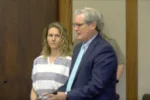In a recent and shocking court case in Michigan, a judge had to face some very serious decisions. Judge Mark Latchana was not happy about the punishment given to two teenagers who were involved in a terrible crime. Jacob Blain, 19, and Willow Reynolds, 18, were sentenced for the murder of their roommate, Adam Reynolds, in a brutal attack that left many people upset. This story is not just about the crime itself, but also about how justice works and what happens when people make bad choices. Join us as we explore this important case and understand why the judge felt the sentence was not enough.
| Attribute | Details |
|---|---|
| Court | Michigan’s Seventh Circuit Court |
| Judge | Judge Mark Latchana |
| Defendants | Jacob Blain (19 years old) and Willow Reynolds (18 years old) |
| Victim | Adam Reynolds (44 years old, not related to Willow) |
| Crimes Committed | Second-degree murder, armed robbery, and additional charges |
| Date of Crime | May 2, 2023 |
| Judge’s Opinion on Sentence | Not appropriate; not adequate for the violence inflicted |
| Judge’s Sentencing Remarks | Expressed struggle with the sentence due to plea agreement; stated it was not enough time |
| Sentence | 20 to 100 years in prison |
| Credit for Time Served | 291 days |
| Restitution | Granted as part of the sentence |
| Apologies | Both defendants apologized to Adam Reynolds’ family |
| Family Impact Statements | Family members spoke about the victim before sentencing |
Understanding the Sentencing Decision
In a recent case in Michigan, Judge Mark Latchana faced a tough decision about the punishment for two young defendants, Jacob Blain and Willow Reynolds. They were involved in a violent crime that led to the death of their roommate, Adam Reynolds. Even though they reached a plea agreement, Judge Latchana felt that the sentence didn’t match the seriousness of their actions. He expressed his concern that the punishment was too lenient for such a brutal crime.
During the sentencing, the judge emphasized the importance of holding the defendants accountable for their actions. He clearly stated that the agreed-upon sentence was not enough considering the violence inflicted on Adam Reynolds. Judge Latchana’s comments highlighted the need for justice that reflects the severity of the crime, showing that he cared deeply about the victim’s family and the impact of the crime on their lives.
The Impact of Victim Statements
A powerful moment during the sentencing was when family members of Adam Reynolds shared their feelings about the loss of their loved one. They spoke about the pain and suffering caused by the violent actions of Blain and Reynolds. Listening to these heartfelt statements reminded everyone in the courtroom of the real-life consequences of crime. The judge wanted the defendants to understand the hurt they caused and the importance of acknowledging the victims’ families.
Judge Latchana emphasized that looking the victims’ family members in the eye was essential for taking responsibility. He wanted Blain to realize that true remorse means facing those you’ve harmed. By addressing the family directly, the judge aimed to highlight the emotional weight of the situation and encourage the defendants to consider the impact of their actions on others. This approach reinforces the idea that justice is not just about punishment, but also about healing for the victims’ families.
The Role of Plea Agreements in Justice
Plea agreements are often used in the legal system to resolve cases more quickly, but they can sometimes lead to disagreements about fairness. In this case, Judge Latchana was not pleased with the deal made for Blain and Reynolds, believing it did not fit the crime committed. While these agreements can help avoid lengthy trials, they can also leave victims’ families feeling like justice was not served adequately, which was evident in this situation.
The judge’s frustration with the plea agreement shows how important it is for the legal system to balance efficiency with fairness. He voiced his concerns about the leniency of the sentence, reminding everyone that some crimes demand more severe consequences. This highlights the ongoing debate about how plea deals can impact the perception of justice and the need for the legal system to consider the severity of the crime and the feelings of victims’ families when making decisions.
Understanding the Plea Agreement System
In the criminal justice system, plea agreements serve as a critical mechanism for managing cases efficiently. These agreements allow defendants to plead guilty to lesser charges in exchange for reduced sentences or other concessions. While this system can expedite legal proceedings, it often raises concerns about whether justice is truly served, particularly in violent crime cases. As seen in the recent sentencing of Jacob Blain and Willow Reynolds, such agreements can leave victims’ families feeling that justice has not been fully realized.
Critics argue that plea deals can undermine the severity of the crime, as they may result in sentences that do not adequately reflect the nature of the offense. In the case of Blain and Reynolds, Judge Mark Latchana expressed his discomfort with the agreed-upon sentence, emphasizing that it did not correspond to the violence inflicted on Adam Reynolds. This situation highlights the ongoing debate about the efficacy of plea agreements and whether they protect the interests of victims and society at large.
Frequently Asked Questions
What happened in the case of Jacob Blain and Willow Reynolds?
Jacob Blain and Willow Reynolds were sentenced for the **murder** of their roommate, Adam Reynolds. They pleaded guilty to **second-degree murder** and **armed robbery**, showing regret for their actions.
Why did the judge think the sentence was not enough?
Judge Latchana believed the sentence didn’t match the **violent crime** committed. He felt that even though the plea deal was agreed upon, it was still too light for what happened.
What did the judge say about the teenagers’ behavior in court?
The judge criticized Jacob Blain for not looking at the victim’s family while they spoke. He emphasized that they deserved to be treated with respect and acknowledged during the sentencing.
What did the judge mean by ‘the evil that you subjected this gentleman to’?
The judge used this phrase to describe the **terrible actions** committed against Adam Reynolds, which included violence and **attacking** him. It highlighted how serious and wrong their actions were.
How long will Jacob Blain and Willow Reynolds be in prison?
Both teenagers were sentenced to serve **20 to 100 years** in prison. This means they will be in prison for a long time, depending on their behavior and other factors.
What did the family of Adam Reynolds say during the sentencing?
During the sentencing, the family of Adam Reynolds spoke about their feelings and memories of him. This was important for the judge to hear as it showed the impact of the crime on their lives.
What does it mean to plead guilty?
To **plead guilty** means that a person admits to committing a crime. In this case, Jacob and Willow accepted responsibility for their actions instead of going to trial.
Summary
The content details the sentencing of 19-year-old Jacob Blain and 18-year-old Willow Reynolds for the murder of their roommate, Adam Reynolds. Judge Mark Latchana expressed his dissatisfaction with the plea agreement, deeming the sentence of 20 to 100 years inadequate given the violence inflicted. During the hearing, family members spoke about the victim, who was brutally attacked, prompting the judge to admonish the defendants for their lack of remorse. Although he acknowledged their acceptance of responsibility, Latchana emphasized that the negotiated sentence did not reflect the severity of their actions, leaving him uncomfortable with the outcome.







